Six tips for staying safe and healthy during storms
- tadsooter
- Nov 4, 2024
- 2 min read
Updated: Nov 4, 2024
Power outages, flooding, and sewage can create health hazards around your home.
Here are quick tips for staying healthy and safe during fall and winter storms. Visit our Storms page for full information.
Only run generators outdoors. Running a generator in an enclosed space, like a garage, can cause carbon monoxide poisoning and death.
When the power is out, don't assume food in your fridge is safe to eat. After losing electricity, a refrigerator will keep food safe for about four hours. A full freezer will keep food safe for about two days. Eating food that's been too warm for too long can make you sick. When in doubt, throw it out!
If the area around your well is flooded, your drinking water might not be safe to drink. If you do not have bottled water to drink, you can purify water by boiling it or adding bleach (1/4 teaspoon of bleach for one gallon of water). See our storms page for detailed instructions.
Give your septic system a break during heavy rains. A flooded septic drainfield can cause your septic system to fail and create a smelly, dangerous mess. You can ease the strain on your septic system by using less water in your house. Simple steps like spacing out showers and laundry loads can help reduce the amount of water draining into your system.
Floodwater can make you sick. In addition to being dangerous to drive or walk through, floodwater can spread germs and chemicals. Avoid touching floodwater and wash your hands with soap and clean water if you do have contact with floodwater.
Hold off harvesting shellfish. Stormwater can carry pollution onto the shoreline, making clams, oysters and other shellfish unsafe to eat. Avoid harvesting shellfish after heavy rains. Always check the state shellfish safety map to be aware of other shellfish advisories.


.png)
